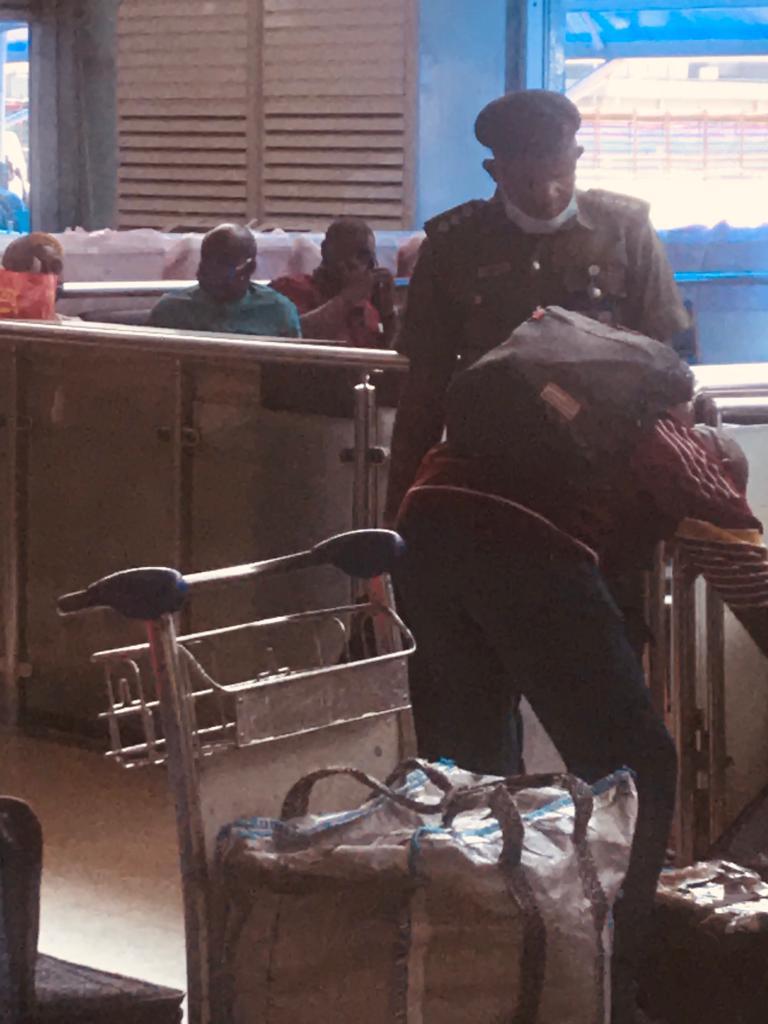
The extortion of Nigerian travellers at the Murtala Muhammed International Airport, Lagos (MMIA) by security operatives has returned with full vigour after the Vice President of Nigeria, Prof. Yemi Osinbajo reduced passengers’ interface with security officials at the introduction of ease of doing business policy at the airport.
In 2018 the federal government introduced seamless check in process whereby passengers luggage were not physically searched at the departure hall but done by x-ray machines at the designated security screening centre.
But when THISDAY visited the international terminal of the Lagos airport on Wednesday, it noticed that beside the x-ray machine which screens all passengers luggage at the entrance of the terminal, officials of the National Drug Law Enforcement Agency (NDLEA), the Department of State Service (DSS), Quarantine and Aviation Security (AVSEC) of the Federal Airports Authority of Nigeria (FAAN) located themselves in a booth where they direct every passenger to bring his luggage for physical search immediately it comes out of the x-ray machine.
This forces the passengers to queue in disorderly manner and form a crowd at the entrance of the terminal and the security operatives take time to search every bag.
THISDAY gathered that the same old routine of forcing some passengers to pay money or some of the things in their luggage would be seized, was being carried out by the security operatives and the passengers who were obviously in a hurry were paying so that they would be allowed to go to the airlines processing counter to check in.
THISDAY investigation also revealed that most of the things they threaten to seize are materials and articles that are allowed to be checked in and when they are given money they allowed the passengers to go with their bags and travel with them.
THISDAY cornered an official of NDLEA (name withheld) who introduced himself as member of the task force official team deployed by the agency to the airport.
He justified the search at the entrance gate, saying that the x-ray machine at that entrance was deficient and does not expose many of the prohibited goods, adding that security officials had discovered guns and cutlasses in passengers’ bags at that entrance.
When THISDAY reminded him that those bags would still be thoroughly screened before they were checked into the aircraft, he said not all of them would be screened again, but THISDAY confirmed from AVSEC official that all the bags would be screened before they were taken to the aircraft and passengers prohibited goods were found in their bags are called out by the airline security team and those prohibited goods are dropped and in some cases the passengers are stopped from travelling.
However, he acknowledged that the US in 2017 donated Smith Detection Body Scan and other security equipment to NDLEA and would in the next few weeks donate more to the agency.
THISDAY also saw a group of quarantine officials on the floor of the departure hall randomly stopping passengers and searching their luggage and some of them were asked to “settle” them or remove certain consumables from their bags.
A FAAN official who craved anonymity told THISDAY that quarantine officials and other security officials were not supposed to be searching passengers luggage in the hall because there is a place designated for such while hand luggage are searched at the x-ray machines along with the passengers as they pass through central search to the airside to board their flights.
Aviation security experts and the CEO of Centurion Securities Limited, Group Captain John Ojikutu who was former Commandant at the airport, told THISDAY that the problem of extortion has been there in the last 30 years and security is compromised when security officials receive inducement from travellers.
“Until we comply with the ICAO (International Civil Aviation Organisation) requirements in Annex 17 to establish a national aviation security committee and also establish an autonomous security agency for the airports that would have all the multiple government security agencies under its control, the situation will remain same. How would the NCASP (the National Civil Aviation Security Programme) give security coordination of all government security agencies to FAAN that was established primarily for airports development and management not for security?
“During my time, I brought all the agencies together and drew roaster that put the head of each agencies including FAAN airport manager in control of the rest for one week. We started this before the US found out they had similar problems and the Al Gore commission recommended the establishment of the TSA (Transport Security Administration) that put all the government security agencies in the US airports under the TSA. That is what for many years I have been asking every minister of aviation to do; I have also advised against the arming of the FAAN security until a unified airport security agency is established.
We don’t need more than two checkpoints: one for immigration and the other for carryon with a screening machine, which all the agencies can monitor remotely. A machine was bought for the Customs and the NDLEA joint usage in 1991, for whatever reasons it was never used and they prefer to work separately. Government must develop a policy for the establishment of unified control agency for the aviation security.
In her reaction, the General Manager, Corporate Affairs of FAAN, Mrs. Henrietta Yakubu said that FAAN made two numbers available for passengers to call whenever airport officials demand for gratification, adding, “There’s provision for Quarantine officials to use, I wonder why they have chosen to use the floor of the departure.”






